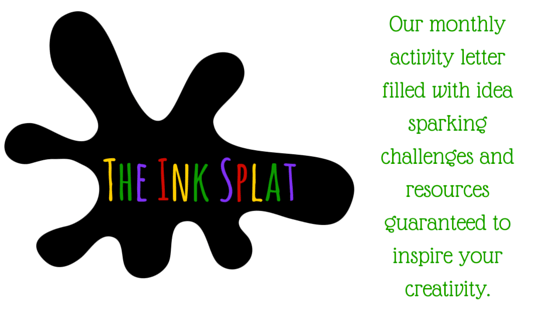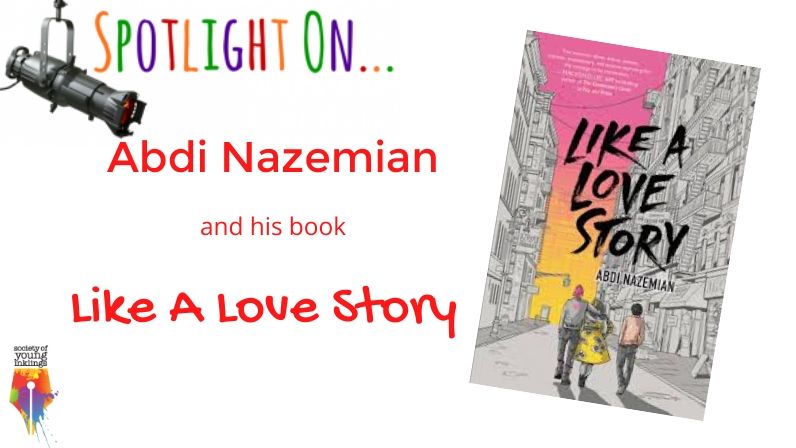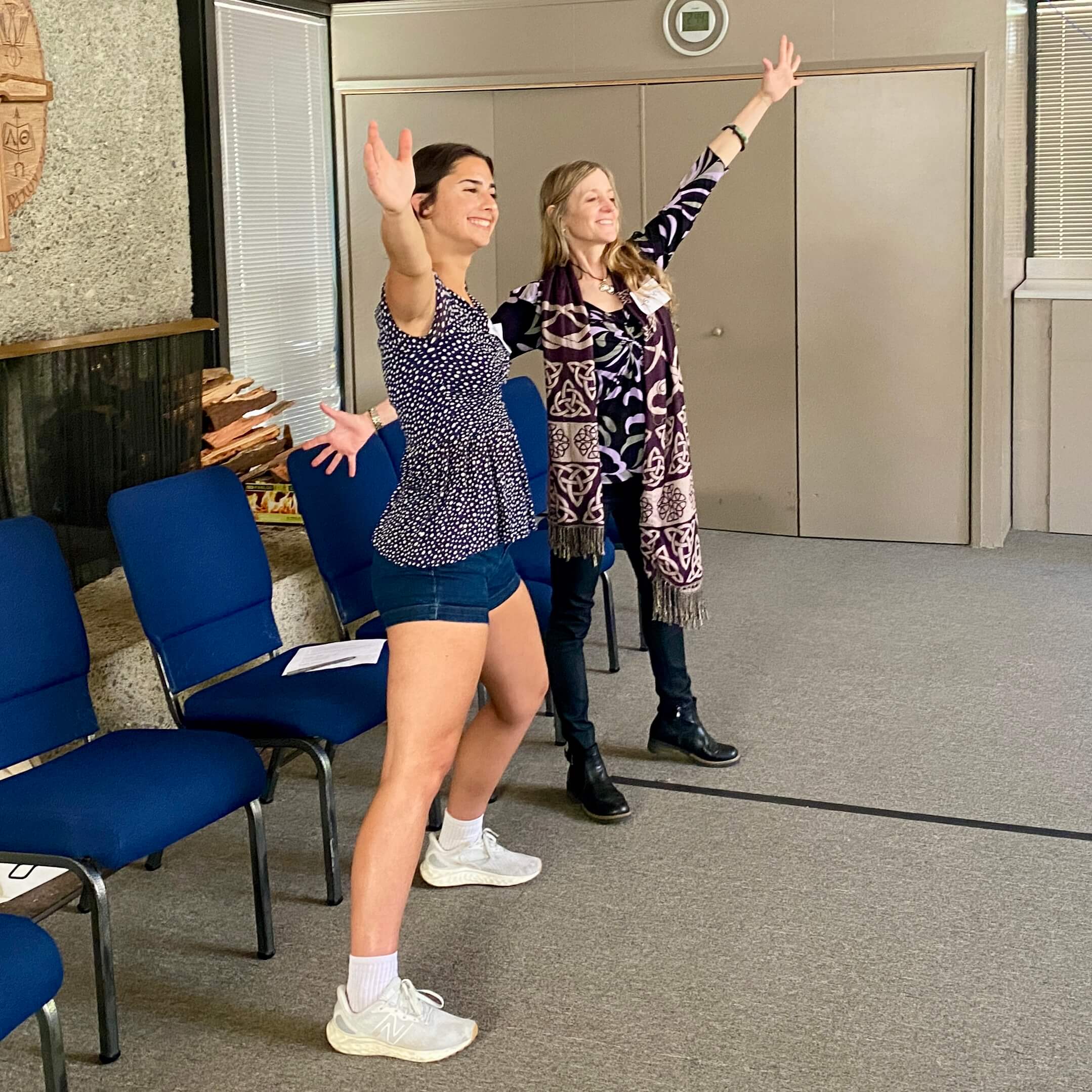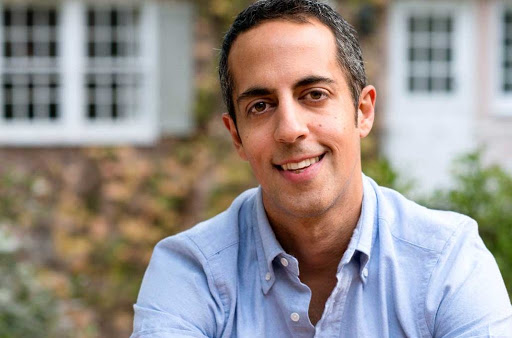This month, we talk to author Abdi Nazemian about his newest YA novel, Like a Love Story. In this exclusive interview, we learn about writing as self expression and some of the history behind Abdi’s book.

Writing Challenge
This month, Abdi has challenged us to be history buffs:

An Interview with Abdi Nazemian
What inspired you to write Like a Love Story?
I’ve wanted to tell this story for many years, but I think I was too scared to tell it for a long time. It’s deeply personal, and inspired by my own emotional experiences as a teen. It’s hard to revisit past trauma. I wanted to capture what it was like to come of age as a gay immigrant to the United States at a time when all I knew of being gay were images of death and disease. I wanted to capture the fear and the shame and the rage of the era, but also the love and unity and heroism. I think that was the big revelation of writing the book for me, how full of love it would be. It’s a hard story, but it’s also full of hope because it’s an ode to the many people – artists, activists, friends, mentors – who helped me overcome my shame and fear.
What was the most difficult and best part of writing this novel?
Often, the most difficult parts of a book are the best, because being challenged is so exciting creatively. One of the most difficult aspects of the book was making sure I represented ACT UP and their activism with accuracy and humanity. I was never involved in ACT UP, but those activists saved my life. Their bravery created a world in which I could love without fear. I researched their work thoroughly. I read so many books, many of which I mention at the end of the novel. I watched every available documentary I could find, and had two ACT UP activists read the book to make sure I was getting it right. I was adamant about not taking liberties with this aspect of the book. This is a tribute to the heroism and heart of every ACT UP member, and getting that part right was definitely one of the most difficult challenges of the book. But it’s also one of the best parts of writing this novel. I was inspired by them all over again as I did my research. And knowing that young people are being inspired by them through this book means so much to me. There’s so much we can learn from these activists. As I write this, we are dealing with a new pandemic, and once again with a corrupt government. It’s often up to communities of activists and artists to speak truth to power in these situations.
Did you learn anything about yourself in this process?
I always learn surprising things about myself in the process of writing. Because my books are so personal, they’re often how I make sense of my identity and answer my own questions. In writing this book, I learned that I was still holding onto a lot of the shame and rage I felt as a teen. Those emotions are still somewhere inside me. But the amazing thing is that with time, and love, and community, they had lost a lot of their power over me. One thing I’ll say about writing is that it allows the writer perspective on their own experiences. Just by writing a story down, you release it from within you and it loses its grip on you. It’s an incredibly powerful process.
Was it hard to go back in history and speak about the LGBTQ+ community, where even today they are still fighting their battles?
Without giving anything away, it was important for me to end the book by bringing the story to the present day, because I know that the issues of our community are still so present. There are so many battles still being fought, all around the world. It is hard for me. My heart breaks each time I hear about queer lives lost or hurt. But I believe with all my heart that my part to play in this battle is through storytelling. By being honest, I hope I can help.
What was your process like creating relatable characters?
To be honest, I have a very mysterious process with creating characters. I do a lot of journaling when I’m writing a book, and trust that the characters will speak through me. In the case of Like a Love Story, I had no idea the book would feature four voices. I started by writing a notecard, not knowing it would eventually be written by Uncle Stephen. Reza came to me next, but as I started writing him, I knew I wanted more perspectives to fill in the story. I think this mattered to me because I wanted the reader to know that different teens were responding to the AIDS crisis in their own unique ways. Judy is a character I had created for a completely different book. I abandoned that book, and pulled Judy into Like a Love Story.
What message would you like your readers to gain from reading this novel?
Well first of all, I love to hear from readers directly about the messages they take from the novel. Every message I receive on social media from readers warms my heart and gives me hope. The story doesn’t belong to me anymore, and it’s exciting to see how people bring themselves to it. But for me, the novel has a few important messages at its core. One is the importance of knowing our history and celebrating it. Growing up, I wasn’t exposed to my Iranian history or my queer history, and I’ve spent a lot of my adult life filling in those blanks. Queer history still isn’t taught in schools, and I hope this book inspires teens to dig further. Also, the book has a simple message, encapsulated in a line from the book: love is our legacy. I want every reader to remember that, and hopefully to make love their own legacy.
What advice would you give to our young writers about staying true to themselves and their writing?
I taught writing for many years, and I observed that many writers start by writing what they think the world wants from them. I did this myself. I spent the first half of my career as a screenwriter writing movies that I thought were commercial, but which I had very little connection to. I think what matters most in writing is honesty. It doesn’t matter if the story you’re telling takes place in an era you didn’t live in, or in a sci-fi or dystopian world you’re creating. If the emotions of the story don’t come from your heart, the reader won’t respond to it. I guess my advice is, learn to recognize when you’re writing from within yourself versus writing for the outside world.
Is there any other advice you would like to share?
Keep self-expressing, whatever that means to you. Writing saved me because it gave me a way to make sense of my life. It was an outlet, and still is. Always keep a journal. It releases the thoughts inside you, and leaves you open to having new voices and characters speak through you. Also, build a trusted community for yourself. Share your writing with those you trust. Having mentors and friends who make you feel safe to express yourself is so important. When you find those people, hold on tight and don’t let go.

INKLINGS CONNECT
THE WAY WORDS MOVE US
Join us September 13 and 14 in Portola Valley, CA for our 2nd Annual Inklings Conference!
Featuring a keynote with author Joanna Ho, this conference includes creative writing breakout sessions in our beautiful redwood grove, workshops on using improv to step into a character’s shoes, experiments in word play, a storytelling workshop, and reflective writing to tap into your unique voice.
A special thanks to Abdi Nazemian for sharing with us! Abdi’s latest novel, Like A Love Story, is available everywhere books are sold and comes out on paperback May 5th! Order Here.
Abdi Nazemian spent his childhood in a series of exciting locations (Tehran, Paris, Toronto, New York), but could usually be found in his bedroom watching old movies and reading.
spent his childhood in a series of exciting locations (Tehran, Paris, Toronto, New York), but could usually be found in his bedroom watching old movies and reading.
Abdi has written for two television shows: Fox’s ALMOST FAMILY, and NBC’s THE VILLAGE. He has written five produced films: THE ARTIST’S WIFE (Strand Releasing, 2020) MENENDEZ: BLOOD BROTHERS (Lifetime, 2017), THE QUIET (Sony Pictures Classics, 2006), CELESTE IN THE CITY (ABC Family, 2004), and BEAUTIFUL GIRL (ABC FAMILY, 2003). He also wrote, directed and produced the short film REVOLUTION (2012). He is proud to say that his words have been spoken by the likes of Carmela Soprano, The Nanny, and The Girl With The Most Cake.
Abdi’s first novel, THE WALK-IN CLOSET, was awarded Best Debut at the Lambda Literary Awards. He has written two young adult novels, both published by Balzer + Bray / HarperCollins: THE AUTHENTICS (2017) and LIKE A LOVE STORY (2019), an Indie Next Pick, Junior Library Guild Selection, Stonewall Honor book, and a best book of the year from EW, Audible, Buzzfeed, YALSA, NYPL and more.
As Head of Development for Water’s End Productions, Abdi has been an executive producer or associate producer on numerous films, including CALL ME BY YOUR NAME, IT HAPPENED IN L.A., THE PRICE, THE HOUSE OF TOMORROW, and LITTLE WOODS.
Abdi lives in Los Angeles with his two children and husband, and holds dual citizenship between the United States and Canada.
Abdi is not the inspiration for Madonna’s children’s book The Adventures of Abdi, though he will forever insist that he is.

